February 1, 2019
Air Date: February 1, 2019
FULL SHOW
SEGMENTS
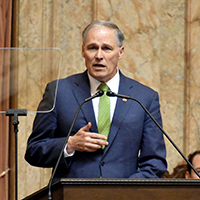
Inslee's Climate-focused White House Bid
View the page for this story
Washington State Governor Jay Inslee, a Democrat, hasn’t yet officially announced his run for the presidency, but he’s positioning himself to be “the” climate change candidate if he does run. With his focus linking economic prosperity with environmental policy, Governor Inslee says the nation has great potential if it has a common purpose, and “there’s no better common purpose than to defeat climate change.” He’s considering making a bid to convince the American people that he can bring the progress he’s made in Washington State to Washington, D.C. Governor Inslee talks with Host Steve Curwood about why federal climate action is urgently needed and how it can be achieved. (18:38)
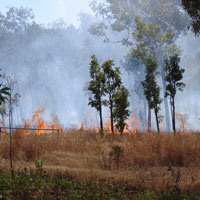
Heat Wave Scorches Nature Down Under
View the page for this story
Australia’s plants and animals evolved to withstand a hot climate, but the extreme heat that the continent has recently been hit with is far from normal. In recent weeks about a third of the bat population has died, water sources are becoming oxygen-depleted, and Australian forests are a tinderbox. Joining our host Bobby Bascomb is Dr. James Watson, Professor at the University of Queensland Australia and Director of the Science and Research Initiative at the Wildlife Conservation Society in New York. (11:05)
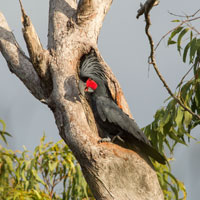
BirdNote®: Palm Cockatoo Gets The Girl
/ Mary McCannView the page for this story
The Australian Palm Cockatoo’s mating ritual involves using sticks -- as drumsticks! The rhythmic beats they make are the first documented instance of an animal using a tool to make music. BirdNote’s Mary McCann has the story on these percussive birds. (02:09)
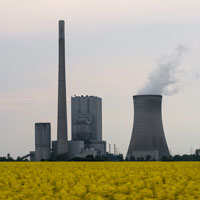
Beyond the Headlines
/ Peter DykstraView the page for this story
Peter Dykstra joins Living on Earth's Bobby Bascomb this week to look beyond the headlines at the German government's plan to end coal-fired electricity generation in 20 years or fewer. Then, they examine the consequences of freshwater lakes and streams becoming saltier and saltier. Finally, the two look back to 1965, when President Lyndon Johnson became the first US President to discuss the science of climate change. (03:46)
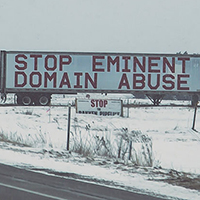
Eminent Domain and the Landowners Who Wouldn’t Back Down
View the page for this story
The government’s ability to exert its eminent domain powers has literally paved the way for much of America’s fundamental infrastructure. Pipelines, highways, railroads, high-voltage transmission lines and more tend to require long paths across the landscape, and farms and even suburban neighborhoods can be caught in the middle. A new book, “The Habit of Turning the World Upside Down,” takes readers to some scenes of places defined by conflicting American ideals of property ownership. Author Howard Mansfield joined Host Steve Curwood in the studio to discuss the costs of eminent domain and why some residents have successfully fought back its threats to their homes. (09:39)
Show Credits and Funders
Show Transcript
HOSTS: Bobby Bascomb, Steve Curwood
GUESTS: Jay Inslee, Howard Mansfield, Kerri Verbart, James Watson
REPORTERS: Peter Dykstra, Mary McCann
[THEME]
CURWOOD: From Public Radio International – this is Living On Earth.
[THEME]
BASCOMB: I’m Bobby Bascomb,
CURWOOD: And I’m Steve Curwood.
CURWOOD: Washington Governor Jay Inslee may be running for the white house to lead as the ‘climate change’ president.
INSLEE: For those who are down in the dumps because we've got a climate denier in the White House -- listen, we've got a mission here, to fight. And the nation just has incredible capability, if we have a vision and a common purpose -- and there's no better common purpose or more necessary common purpose than to defeat climate change.
BASCOMB: Also, Australia is experiencing a heat wave for the record books and it’s taking a toll on the unique wildlife there.
WATSON: I remember I could never touch the bottom of the river-- as much as I could dive I could never touch the bottom. Now it’s literally knee high, tens of meters of water across the river system are just gone. Fish have to survive in that system and when there’s a heat wave event it just gets too hot. There’s not enough water and the fish die.
CURWOOD: We will have those stories and more this week on Living on Earth – Stick Around!
[NEWSBREAK MUSIC: Boards Of Canada “Zoetrope” from “In A Beautiful Place Out In The Country” (Warp Records 2000)]
[THEME]
Inslee's Climate-focused White House Bid
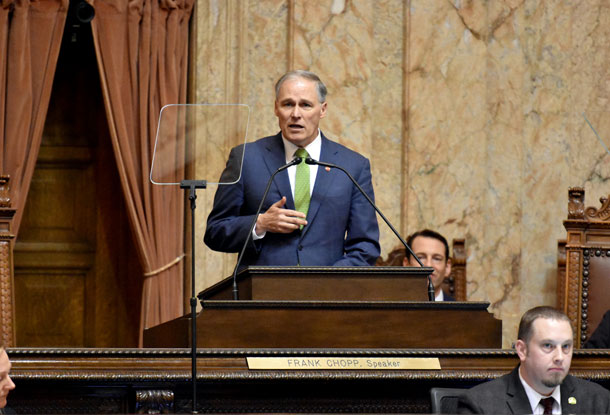
In Washington Gov. Jay Inslee’s 2019 State of the State address, given on January 15, 2019, he implored legislators to act on climate change. Gov. Inslee is contemplating a run for President in 2020. (Photo: Office of the Governor, Flickr CC BY-ND 2.0)
[THEME]
CURWOOD: From PRI and the Jennifer and Ted Stanley Studios at the University of Massachusetts Boston, this is Living on Earth. I’m Steve Curwood.
BASCOMB: And I’m Bobby Bascomb.
It’s still more than year before the first US presidential primaries, and no Republican has yet to announce he or she will go after President Trump. But, there are a couple dozen Democrats who have either announced or are flirting heavily with the notion of campaigning, including at least two who say climate change would be front and center if they do run. Former New York City Mayor and billionaire Michael Bloomberg visited the early primary state of New Hampshire at the end of January to explore running, and he’s famously donated millions of dollars to advocates of climate protection.
CURWOOD: Polling ahead of Michael Bloomberg in a recent Rolling Stone ranking, Washington State Governor Jay Inslee has also been to New Hampshire and he sees himself as the climate change candidate, though he has yet to declare. Jay Inslee has been Governor of Washington since 2013, and before that served eight terms in Congress. While in Congress, Governor Inslee wrote the book "Apollo's Fire," in which he presented the core idea of what people today call today "Green New Deal, " that is the economic prosperity that a clean energy revolution could bring. Governor Inslee joins me now from Seattle. Governor, hi there! Welcome to Living on Earth!
INSLEE: Yeah, it's a good place to live. We'd like to keep it this way.
CURWOOD: Indeed. So, tell me, why do you want to be president?
INSLEE: Well, I haven't made the decision to run yet, but should I do, it's because I believe that we have an existential threat to our well-being, and the nation's future. In order to defeat climate change, I do believe that it will require a leader who will call forth the best innovative talents and intellectual energies and spirit of optimism that this nation has, and put it to work, defeating climate change and building a clean energy economy. And we have to have that voice from the White House to do that. And when we get that kind of rallying cry, this nation can do amazing things. We went to the moon because we had a president who called forth that effort, and we did it; we defeated fascism. The nation just has incredible capability if we have a vision and a common purpose, and there's no better common purpose, or more necessary common purpose, or more urgent common purpose than to defeat climate change. So, there's many other things that I know our nation needs. They need what we have in Washington, a net neutrality bill, a family leave bill, an increase in the minimum wage, a gender pay equity bill, a reproductive parity bill, a transportation infrastructure that we have. We've got all these remarkable things I and others have been able to accomplish. But fundamentally, we need this as the first and foremost priority in the United States.
CURWOOD: About 12 years ago, you wrote a book, it's called Apollo's Fire. It's about bringing labor and clean energy advocates together. Today, there's all this buzz about a national Green New Deal. So, let's fast forward a couple of years -- ah, you've just been elected president of the United States, Jay Inslee -- what should the Green New Deal be going forward in the Inslee Administration?
INSLEE: Number one, it needs to be very ambitious, and it needs to be of large scale and scope. And that has to be a scope that is similar to what we did in the Apollo project, similar to what we did when we defeated fascism. Because we know that during the next several decades, we have to decarbonize our economy, we will not be able to be putting gigatons of carbon dioxide in the air decades from now from burning fossil fuels. That is a scientific fact. And so, you have to reorient the entire federal government around this purpose. In our transportation policy, we have to embed the use of non-fossil fuel based systems and public transportation to reduce our co2 footprint. It has to do with some of our land use planning so that we decrease the distance people have to travel to and from work. We need to update our building codes so that we have more net zero commercial buildings. And it has to embrace the idea of bringing equity to our economy to break this horrendous situation of the haves and have nots where all of the economic gain is going to the top X percent. And that means we have to build jobs around this, with huge training programs, to essentially allow people options to go into these new clean energy jobs. That's important, not only for the people, but it's also for the businesses because they're going to need this talent during this transition.
CURWOOD: Now, it's been a decade since you were in Congress supporting the Waxman-Markey bill to put a limit on carbon dioxide; it didn't pass and, you know, tell the truth, not much has really happened since then. Why do you think you can break this log jam?
INSLEE: Well, it had, I'll just take issue a little bit with that -- it hasn't happened in Washington, DC. But it has happened in California. It has happened in Washington, it is happening in Oregon and British Columbia, and a lot of the rest of the world. So there actually has been a lot of action, Jerry Brown and I, and Governor Cuomo, we started the US Climate Alliance. And we have now 18 states; if we were a separate nation, this US Climate Alliance, we would be the third largest nation or economy in the world. I'm not suggesting that, by the way, we're happy as states at the moment! So, we are actually making progress in the states. In my state, we're second at having the most electric vehicles, we have a renewable portfolio standard that has created this multibillion dollar wind industry and putting hundreds or thousands of people to work. We are doing great research and development into new technologies. We're building electric charging stations up and down our freeway system; we are moving the needle in our states where we have leadership. And I think that's an important point because the American people are ready to go, they just need a little leadership to launch the starter's pistol here. And where we have that we are making progress. In my legislature, this year, I am promoting five new bills that will give us 100% clean electricity, cleaner transportation fuels, and a host of other things. But we need to have that kind of leadership in our nation's capital so that the most innovative can-do people in the history of the world, namely, Americans, can get to work here and grow jobs which are growing by the bucket full.
CURWOOD: Well, okay, so how do you break the Washington, D.C. log jam?
INSLEE: Well, the first and foremost thing you do is get a president who's not denying the existence of climate change. And that's the most fundamental thing -- look, we got a president who's out of touch with the science that sixth graders know in my school districts, across the state of Washington understand the science of climate change, and you got a president who's denying it. That's a first and foremost thing you do. And we do it as fast as we can, and with as much dedication as we can.
CURWOOD: So, that'll be you.
INSLEE: It could be, and if it's someone else who can do a better job, let them have it. But we got to get somebody who has a vision statement to make this the paramount duty of the state of Washington --the United States. And here's the reason I say that. This isn't an easy job. It is a hard job. And it's just like Kennedy said, we choose to go to the moon, not because it's easy, because it is hard. And you have to muster the political capital, you have to have the dedication, you have to have the perseverance to get this job done. So, you have to make it a priority. And the reason it's appropriate to make it a priority, is climate change is so many other issues wrapped around it. It's social equity, it's building a more equitable economy so that working people have a shot to have a decent wage. It is an issue of national security, because we know the Pentagon recognizes this, the mass migrations driven by starvation because of the deserts growing here and across the planet. It's an issue of health, where our children are experiencing increasing asthma rates because they're breathing this toxicity from diesel and fossil fuels. So, this issue is a priority, in part, because it can address all of these other issues and unite us around a common purpose to get this job done. So, getting a new president is the first, and obviously, we're going to need some changes in the Senate to get this done. We've had major increases in the house this year, because the people of the United States, even with gerrymandering, basically tossed out a bunch of the Trumpistas and replaced them with people that want to get down to this business of defeating climate change. That's a really good thing.
CURWOOD: When you're president of the United States, what changes do you expect to make in the way that we handle our public lands?
INSLEE: First we need to do is to break free of the shackles of the fossil fuel industry and their control of the US Congress. These are public lands; they don't belong to the fossil fuel industry. The fossil fuel industry is the most powerful economic juggernaut in human history. And they pretty much have bought and paid for and control the Congressional system. That needs to change. And one of the first places to do it is to stop them from raiding our public treasury, which are our public lands, those are our ultimate source of health and clean water and recreation. And unfortunately, Trump, as you know, has tried to turn it over; he hasn't drained the swamp, he's given it to the alligators! And he wants them to get rich on it. And we know that scientifically, the vast majority of that fossil fuel has to remain in the ground if we're going to have a fighting chance to stop civilization-jeopardizing climate change. And some of that language might, you know, strike you as vaguely apocalyptic, but that's what the science says. It just says we are going to be facing major changes in our life, for mass migration and starvation, and changing the ability to have fish in our rivers to go fishing, or snow in our mountains, or forests in my state. Look, I grew up hiking in my state, and it's just so beautiful, our forests are so beautiful. They are essentially going to be devastated if you end up taking all this fossil fuel out of the ground and putting it in the air, you're going to kill our forests. And I don't think that's a vision we should accept. So, it starts with a populist uprising against the fossil fuel industry and it moves on from there.
CURWOOD: My guest is Jay Inslee, the governor of Washington State. He's looking closely at running for president as a Democrat. We’ll be back with him in moment. Keep listening to Living on Earth.
[MUSIC: The RH Factor, “The Scope” on Nothing Serious, Verve Records]
ANNOUNCER: Support for Living on Earth comes from Sailors for the Sea and Oceana. Helping boaters race clean, sail green and protect the seas they love. More information at sailors for the sea dot org.
[CUTAWAY MUSIC: Nina Simone, “Love O’ Love” on Silk and Soul, by A. Stroud, Legacy Recordings]
BASCOMB: It’s Living on Earth, I’m Bobby Bascomb.
CURWOOD: And I’m Steve Curwood.
We're back now with Jay Inslee, Governor of Washington State and a likely Democratic candidate in the 2020 presidential campaign. So, Governor Inslee, you know, the surveys show that a majority of Americans care about climate change, think it's a problem, but only a minority think that urgent action is needed. Most folks say, hey, there's -- the studies predict disaster a dozen years out -- figure, hey, we have a dozen years to get our act together. How do you get people to move now?
INSLEE: Well, that actually is changing very dramatically. And actually, just since last March, because people have watched Paradise California burn to the ground. And that's pretty stunning. I was there a few weeks ago.
CURWOOD: How did you feel about that? When you saw it.
INSLEE: Devastated. You know, I drove for an hour -- by the way, this is not a small village, this is 25,000 people -- I drove for an hour. And every so often you'd see one house that wasn't destroyed. But otherwise, that whole town was burned right to the foundation. When you see that, as Americans are; when people now see the massive flooding in Texas; the sea level rise in Miami, where I was a few weeks ago, where I went with the mayor where they had to, they've had to build the roads up a foot and a half. So now in Miami Beach, you have to walk down to the shops because the streets have to be up above and they're still getting inundated. When you see the Great Barrier Reef, one of the world's largest living systems -- half of it is dead today. Not 50 years from now; today. Here in Seattle, I've lived here for decades; for the first time, ever, people woke up in the morning and there was ash on the hoods of their cars, because we had these catastrophic fires in the eastern Cascades and in British Columbia. It's never happened before. And people were kind of shocked by this. Our air quality this summer was so bad, we had to close swimming pools because of the forest fire smoke, and kids cannot go out and go swimming. Our air quality last summer was the worst, and I hate to say this, but it was the worst in the world. Not Beijing, not New Delhi; Seattle, Washington. And unfortunately, this could become the normal if we do not act, because our forests are so stricken because of drought and heat conditions. So, the point is, people are now recognizing the urgency of this. And the scientific community has made this clear. And unfortunately, two years from now, in November 2020, it's going to be worse. And there's going to be more people who understand that because the science makes this clear that it's getting worse every year. So, we need to skate where the puck is going to be, rather than where it is right now. And it is going to be in a place where more and more people realize we've got to act.
CURWOOD: Now, there's something called the Environmental Voter Project, that says the most green voters, those who put the environment like number one or number two of their top priorities -- these are registered voters -- are young folks, and people of color -- black people, and Hispanics. But these registered voters don't vote because, in part because the researchers say, no one asks them for their votes. Politicians typically will do little surveys and go after the folks who regularly vote. So, if you don't vote, you don't get asked. How are you going to find these super green voters and get them to support your candidacy? Should you finally decide to run.
INSLEE: Well, the same way that Stacey Abrams did in Georgia, who ran such a good race, who energized young people and people of color, and we are dedicated to that and I've had some success in this. We picked up 10 seats in our legislature this year, in part because we went to communities of color. And this message is very important. I remember meeting a woman, a 14-year-old Latina young woman who on the banks of the Duwamish here in Seattle, it's the industrial area; where she said that she was 11 years old before she found out that some kids didn't have asthma. All her friends at asthma, because she lives next to the freeway and in this industrial area, where there's a lot of pollution. The people who get hurt first by climate change are the people who live in poverty and the marginalized communities. And that's why the climate change issue is an issue of equity, social and economic equity, because the first people who are going to be saved are those who lived on the edges of our society next to the freeways, and the toxic waste dumps, and the cancer alleys. For the young folks, we have gone to campuses. In fact, this year, I started a competition between the colleges to see who could register the most young voters. And so, the winner's coming down to lunch next week to celebrate that victory. So, we have been very intensely focused on that. And they are all over this, they get this big time and they are looking for a candidate who will champion this mission. And I could be that candidate.
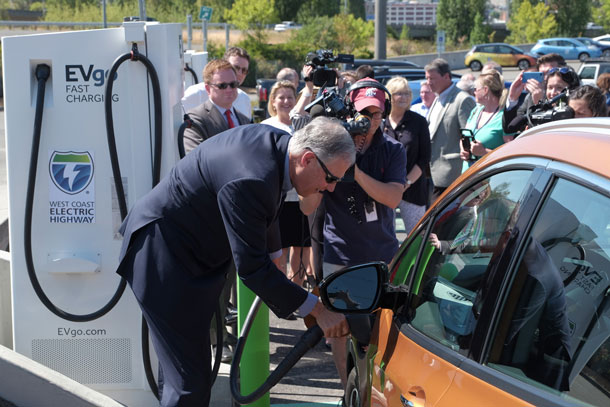
Gov. Inslee at a ribbon-cutting ceremony for new electric vehicle fast-charging stations in Tacoma, Washington on Aug. 7, 2018.(Photo: courtesy of Forth Mobility / Jay Inslee, Flickr CC BY-ND 2.0)
CURWOOD: Governor, you've pretty confidently said, you're ready to go up against President Donald J. Trump. How do you even envision having a debate with him about climate change, especially when every time the country faces an especially cold spell, he hints that, it's all a fiction.
INSLEE: Well, I would be eager to have that opportunity. I feel very confident in that matchup. I feel that the nation is an optimistic nation, and he is a pessimistic man. I feel we're a courageous nation, and he is a fearful person. He is driven by insecurities. We know where bullies come from, beliefs come from a sense of insecurity. And it's clear that that is at his core. So, I've had a confrontation with him once already in the White House. And I have felt confident from that, that I will be in good shape on any stage with him.
CURWOOD: Tell me how you took him on in the White House.
INSLEE: I was there with the National Governors Association, and we were discussing gun safety after the school shootings. And his answer was, we'll have first grade teachers just wear Glock pistols on their, on their waist and that'll solve the problem, which I thought was ridiculous. And so, does the vast majority of Americans. So, I told him that; I stood up and told him about that. And he just sort of, he adopts this sort of petulant, arms crossed and he rocks, he rocks back and forth when he's insecure, you can see it and I told him eventually -- I just closed by saying, you know what, you need to tweet less and you need to listen more. You need to listen to teachers about this ridiculous idea of yours and you need to back up. And he just didn't really respond. So, I had a person-to-person confrontation with him and feel very confident about my ability to do it. Now on the climate change aspect of this, the country gets this on the science. There's no question about the science. The vast majority of Americans understand that. So, we're past that. I think that the climate change message in a race against him is not just about the science of climate change. It's about the character of the American people. I represent a vision based on optimism and a can-do spirit. He represents a vision of a cramped, pessimistic, fearful nation that has to retreat behind walls, and can't innovate its way out of a box. I represent a nation that wants to lead the world and be a leader in the world as we historically have. He wants to think the only industry we're going to have is the ones that were here in 1900. So, those are debates about the American character that I think we have the winning side on, and that's why I'm confident about a matchup against him because it's about America as much it is about the science of carbon dioxide. So yes, I would be eager for that.
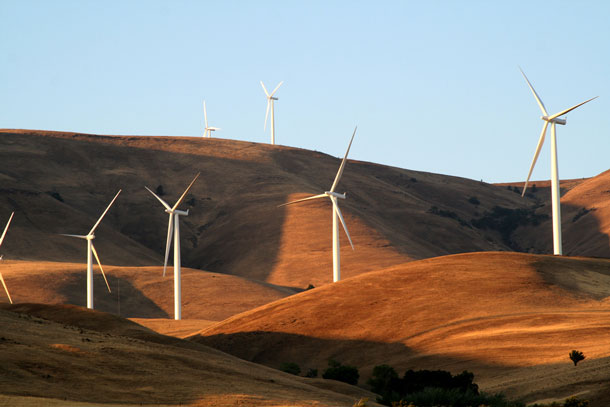
Washington state is blessed with plentiful sources of carbon-free energy. Wind energy and solar contribute modest amounts of electricity to its grid, but by far the largest source of the state’s energy is hydroelectric power.(Photo: CJ Anderson, Flickr CC BY-NC 2.0)
CURWOOD: I know you're officially still thinking about this; are you prepared to have not very good food; sleep in really lumpy beds; not see your family very much; get hammered by the press; have, some nights, horrible results from the polls to become president of the United States?
INSLEE: Well, I'll just give you an anecdote about that. We were trying to get to New Hampshire last weekend, and they canceled our flight. We drove about four or five hours over icy roads from New Jersey to New Hampshire. We got to a motel at, I don't know, midnight, one o'clock? Got out of the car and it was, you know, nine degrees and the wind was blowin' like a banshee. And I turned to my buddy who was accompanying me saying, Hey, man, this is heaven on earth. Because I'm in New Hampshire, potentially running for president of the United States with a vision that I really believe in. And that's how I felt. This is a grand opportunity for us. It's a time of great peril. But it is a time of great promise, of economic growth. And for those who are down in the dumps, because we got a climate denier in the White House -- listen, we got a mission here, to fight. And there's nothing better than when you're fighting on a grand crusade with people who you believe in. And that's what we're doing here. So, these are good days to be alive. And I may end up being a candidate, we'll see.
CURWOOD: Jay Inslee is governor of Washington State and considered by many to be a Democratic candidate in the 2020 presidential elections. Thank you so much, Governor.
INSLEE: Thanks for having me. Don't forget to vote.
Related links:
- The Atlantic | “Jay Inslee Is Betting He Can Win the Presidency on Climate Change”
- About Governor Inslee
- Governor Jay Inslee’s book “Apollo’s Fire”
[MUSIC: David Grisman Quintet, “Dawgnation” on Dawgnation, by David Grisman, Acoustic Disc]
Heat Wave Scorches Nature Down Under
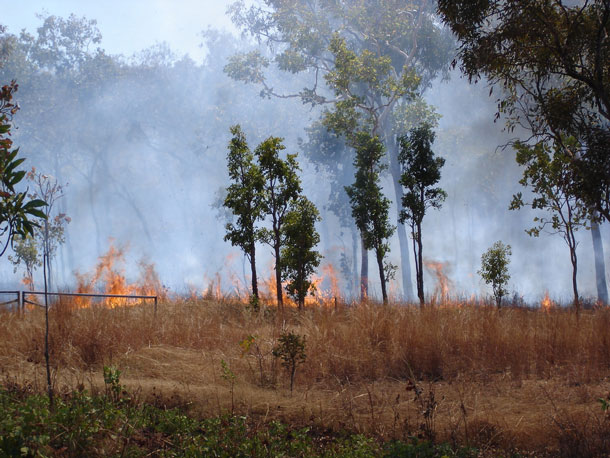
Due to the hot, dry temperatures caused by heatwaves, fires are rampantly appearing across Australia. (Photo: fvanrenterghem, CC BY-SA 2.0)
BASCOMB: As parts of the US dealt with a polar vortex and record cold temperatures Australia is in the grip of an unprecedented heat wave. And Steve, we’re not talking 90 or 100 degrees but more than 120 degrees in some parts of the country for days on end. And, as you know, Australia is no stranger to hot dry weather of course.
CURWOOD: Oh, that’s right…
BASCOMB: But this heat wave is something out of the ordinary even by Australian standards. I have a friend, Kerri Verbart, who lives in Adelaide, Australia on the south coast.
CURWOOD: Now Isn’t that where the good Australian wine comes from?
BASCOMB: Yes, that’s right, exactly. And normally, Adelaide has a lovely Mediterranean climate, warm and dry for sure but Kerri told me that people there are really struggling to deal with 120-degree heat.
VERBART: It just feels so hot. I know that sounds crazy but it’s just like a sauna or a dry oven or a sauna with a hair dryer blowing on you at the same time. Or a big hot fan blowing on you. A lot of people didn’t go to work including my husband who works on building sites. Well, he went in the morning and was home by lunchtime.
CURWOOD: Man, that sounds pretty miserable.
BASCOMB: Yeah, but you know there are always people who can make lemonade out of their lemons.
VERBART: People were frying things in frying pans, baking cookies you know in a frying pan on the pavement. You can actually cook.
CURWOOD: Wow
BASCOMB: The way Kerri describes life there right now it really reminds me of living in New England in winter, as we do. She says the Red Cross and emergency personnel check in on the elderly to make sure they are doing ok. And, people are generally just grumpy and mostly stay inside and hibernate.
VERBART: Most people are in their homes with the air conditioning on. You didn’t see many people at the pool either so obviously, many people are thinking it’s even too hot to go to the pool. Shopping centers are what are busy at this time because they’ve got fantastic air conditioning systems. So, if people at home their air conditioning is struggling they seem to flock to shopping centers, cinemas, and places that have great air conditioning.
BASCOMB: So, it’s certainly uncomfortable for most people but nearly everyone has air conditioning or access to a place that’s air-conditioned. The real victims of the heat wave are Australia’s many plant and animal species that are endemic that is, found nowhere else on earth. They’ve evolved with Australia’s mostly hot dry conditions but this unprecedented heat wave has proven devastating even for them. I spoke to James Watson about that. He’s director of the science and research initiative at the Wildlife Conservation Society. Welcome to Living on Earth, James.
WATSON: Thanks for having me.
BASCOMB: So, James, please describe the heat wave and the drought. How does this event compare to what Australia usually experiences?
WATSON: Well, this is the worst on record. We've never had a heat wave like it and it's extensive so, it covers the entire continent. And, it's just really hot. So, for those two factors, it's really unique. No time in the last, you know, climate measurements have we seen a heatwave go across the continent, from Tasmania to Western Australia, to far north Queensland. And then the degree of heat is just enormous. We're getting up to 50 degrees Celsius in some of the major cities which is just extraordinarily hot. And it's not just for, you know, a day or half a day, it's lasting for a week.
BASCOMB: Yeah, for those of us over here, 50 degrees Celsius is about 122 degrees Fahrenheit. I've seen maps where the whole continent is just red, you know, from the heat map, it's 100% red.
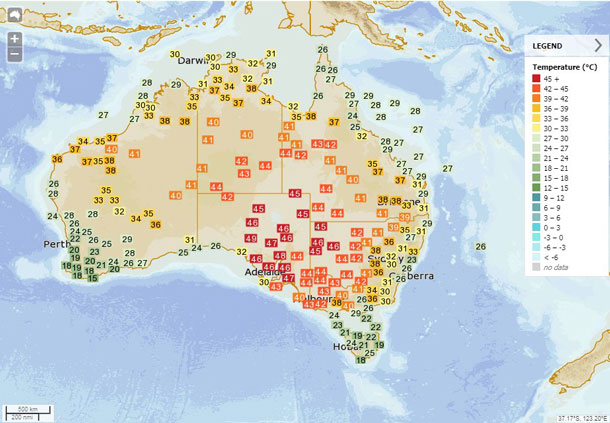
The Bureau of Meteorology in Australia reported record breaking temperatures during the heatwave. (Photo: Courtesy of the Australian Bureau of Meteorology)
WATSON: What's unusual is the Bureau of Meteorology over here had to create new colors for the map. That's how hot it is. So, it's a sad indictment of climate change. Uhm, and, it's, you know, it's obviously going to be the new norm, and it's really affecting both people and wildlife across the continent.
BASCOMB: Of course, the vast majority of the population of Australia lives along the coast and in the middle of the continent is mostly desert or very arid. To what degree is desertification, a concern if this kind of drought and hot temperature persists?
WATSON: Oh, it's massive. It's a massive issue. The hot weather is one thing, it's the land clearing which is causing desertification. It's actually because you're removing trees and nothing's being replaced by trees because it just simply too hot, you get grasslands which then die, which then the deserts you know, so it's a huge issue and it's one that Australia is going to be increasingly facing. So, it's- the heat wave plays an extraordinarily important role in this because it kills the vegetation that is remaining but the most important thing is to put vegetation back there in the first place or stop clearing vegetation. That- if you want to stop the desertification you keep intact ecosystems intact and that means that the soil becomes stable and the deserts don't increase.
BASCOMB: How is the heat wave affecting different ecosystems there, for instance, forests?
WATSON: There's fires occurring Tasmania right now in forests that have never been burnt. Which is terrible because they'll never recover. These are endemic World Heritage forests, these cool, wet forests that you'll find in the southwest. And, you know, endemic species of tree and shrub and birds and mammals are actually all getting wiped out as a consequence, because they're not adapted the fire. In other parts of the continent, we're seeing more fire, uhm, not to that extent. But what is interesting is that because of logging and because of degradation of the forest by human activities, such as roads and farming, building urban settlements in the middle of forests, means a fire can access these forests in ways obviously, they wouldn't naturally. And, that is making these forests less resilient to fire and when it's warm and dry it means you just get more and more fire. So, if you look at a map of Australia right now, there is just spot fires everywhere across the continent because this kind of drawing effect, because of the fact that it's really easy to set fire to a forest due to electrical storm or something like that. And the fact that these forests are just really dry and non-resilient, it means they burn really easily.
BASCOMB: And, you said Tasmania many has so many endemic species, that’s species you don't find anywhere else in the world. And if they're not adapted to fire, as you said, I mean, are you looking at extinctions there?
WATSON: Oh, yes. Yeah. And we're talking about extinction of plants that evolved in Gondwana period, you know, 60 million years ago. Some of these plants are incredibly unique, and you know, adapted to these cool wet climates, you only really get in the southern hemisphere in places like Chili, Tasmania, and New Zealand. But, so, the species in Tasmania have obviously isolated from those other two continents for a long time. So, they're all unique. They're all different species. And, they're not fire adapted. And, so, any fires bad. And if you look at some photos, there's, you know, it's all on the way, if you just Google Tasmanian fires, you will see huge swathes of the World Heritage Area just cindered black. And, the fact is they won't recover. These species have no way to recovering. So, something will come back, but it won't be the ecosystem type that we have experienced for the last 60 million years. So, it's very sad.
BASCOMB: I understand a lot of animal species are also really struggling with the drought and the heat. Can you tell me about some of those?
WATSON: We're seeing evidence of this heat wave affecting species all around the continent. Right now, in a place called Menindee Lakes, we have thousands and thousands of fish just bubbling to the surface of the lakes because of the heat, because of the low water levels, this system is unlikely to recover for a very, very long time, if not at all. In other parts of the continent, we're seeing things like flying foxes, hundreds and hundreds have been falling out of trees and colonies simply because they're cooking in the tree. They're getting to a temperature that they just can't survive, so they literally die in the tree and fall on the ground in their thousands. Again, entire colony structures have been wiped out by this heat event.
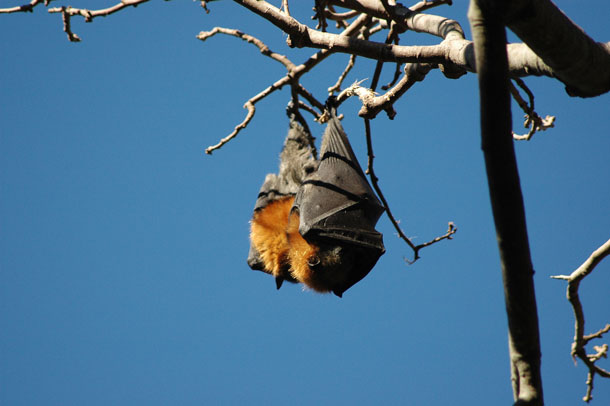
It has been reported that one-third of Flying Fox populations in Australia have been lost due to severe heat exhaustion during the heatwave. (Photo: Amaury Laporte, CC BY-SA 2.0)
BASCOMB: Of course, these animals are native to Australia and no stranger to hot, dry conditions. Will they be able to bounce back from these types of hits to their population?
WATSON: Well, it really depends. I mean, yes, they naturally adapted to hot, dry conditions. And of course, they've gone through extreme events in the past. This is very unusual; this hasn't been set on record. So, you know, whether they can survive this particular extreme event is yet to be seen, but they should have the resilience in their populations to survive. The problem is that we haven't got natural populations of species anymore. In Australia, I think it's the world leader in terms of mammal extinctions around the world. We have decimated our landscapes because of land clearing, especially in the south and the east. So, to answer your question, we don't know. We don't know. What we do know is that many of these populations are likely to struggle.
BASCOMB: What about freshwater ecosystems? What's going on there?
WATSON: It's a real disgrace, to be honest. What we have in the Murray-Darling river system, which is our big river system in southeastern Australia. It's been running very low for many, many years, because of irrigation. Because there's all the environmental flows have been going to the farmers. You know, I used to live out in one of those rivers. And, you know, I went out there the other day, and it's, you know, literally- I remember a river that I could never touch the bottom of the river. As much as I could dive, I could never touch the bottom. Now it's literally knee-high water across the entire river. You know, tens of meters of water across the river system is gone. Obviously, fish have to survive in that system. And when there's a heatwave event, it just gets too hot. There's not enough water and the fish die. And they get toxic blooms, which kills them by poisoning. And the consequences are these kind of massive fish kill events. And obviously, it's very distressing for local people. It's very distressing for the indigenous people who live out there. And it's a very sacred area for Australians, you know, Indigenous Australians who are seeing their entire system die.
BASCOMB: So, the heat wave is just exacerbating a situation that already existed.
WATSON: That's right. I mean, yeah, the water is just much, much hotter. You know, fish can't live in really hot water. So, it looks like a massive problem. It looks like a problem that, you know, it's hard to overcome, how do you solve climate change? Well, you know, simply get your house in order when it comes to habitat management.
BASCOMB: I have a friend in Australia who told me that she sees buckets of water all over the place that people leave out to help animals. And, is that a good idea? I mean, does it even help? Or, is it just a drop in the bucket? If you'll pardon the pun.
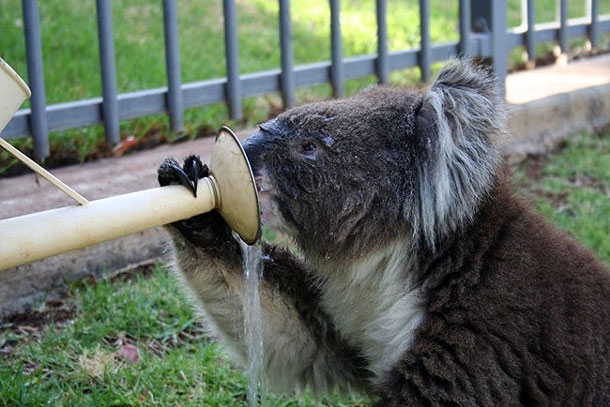
In an attempt to assist wildlife, many people have been putting out water and shade to provide some relief in the heatwave. (Photo: Sunrise on Seven, CC BY-NC-ND 2.0)
WATSON: I think it's, I think it's good for urban wildlife. Absolutely. You know, like, obviously, you know, when you've got buckets of waters out there, you know, you have other things coming to it. So, where there's invasive species, such as toads, they'll like that, as well, you know. So, you're encouraging the persistence and all nature, not just native nature. But, I think, yeah, this time and place absolutely. I think putting out water is a good thing. It helps birds survive, it helps mammals survive. Putting shade, it means it's cool places for things to sit. And there's also it brings nature to your backyard, you know, which is a good thing for children and you know, yourself to actually just experienced stuff. But, you know, that's a small drop in the wider ocean. 99.9% of species, don't live in cities, or urban areas, or, you know, even townships. They live out in the bush. And, the bush is really where the water needs to occur. And that means we need rain, we need rivers the flow naturally, we need habitat to be in good nick so spaces can move around. That's the trick. You know, and therefore, putting out a bucket of water is a good idea. Voting for a government that actually is progressive on things like climate change, and on doing the right thing for nature is probably an equally good thing to do.
BASCOMB: That’s James Watson, director of the science and research initiative at the Wildlife Conservation Society.
Related links:
- More information on Dr. James Watson
- New York Times | “Thousands of Fish Die in 3rd Mass Death in Australian River"
- CNN | “Dozens of Wild Horses Die of Thirst in Australia’s Heat Wave”
- Australian Bureau of Meteorology Heatwave Report
[BIRDNOTE THEME]
BirdNote®: Palm Cockatoo Gets The Girl
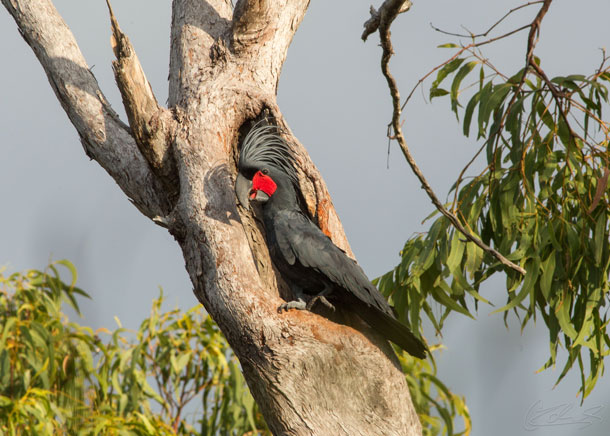
The adult palm cockatoo can grow up to two feet in length. (Photo: © Christina Zdenek)
CURWOOD: We stay in the Land Down Under to bring you a unique way to pick up a mate. BirdNote’s Mary McCann explains that a male Australian Palm Cockatoo uses much more than just his voice to make seductive music.
BirdNote®
Palm Cockatoo Gets the Girl
In the music world, it’s often said that the drummer never gets the girl.
[Palm Cockatoo screech]
But is this true? Maybe not for wild Australian Palm Cockatoos.
[Palm Cockatoo screech, then drumming and Australian ambient throughout]
For the first time, ever, an animal has been documented making a tool to create music. Male Palm Cockatoos use their enormous beaks to break off a stick or seed pod from a tree. The bird then fashions it into a sort of drumstick. Clutching the stick in his left foot, he beats on a hollow tree.
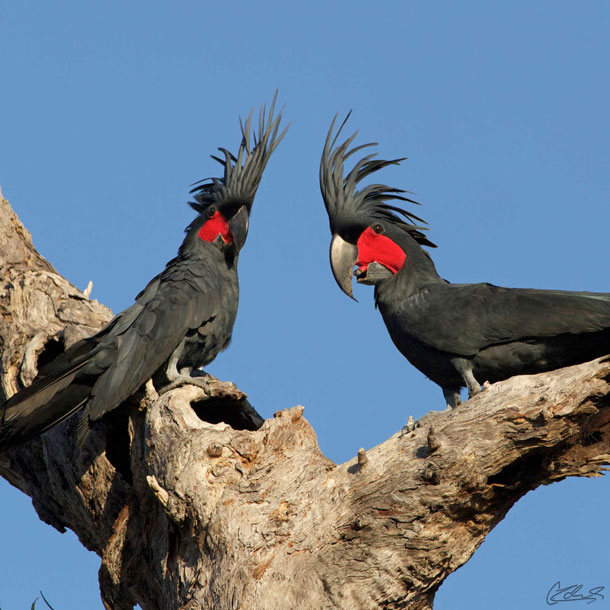
The palm cockatoo is one of only a few bird species known to use tools, and possibly the only animal species to use tools specifically to make music. (Photo: © Christina Zdenek)
Most animals that use tools do so to get food. But these cockatoos seem to do it specifically to create a rhythmic beat designed to impress their potential mates.
Drumming is just part of an intricate courtship display. The male cockatoo sways his body, stretches his wings, and erects his long, slender crest feathers, all the while producing loud, high-pitched whistles. Not only that, but he "blushes" — his bare cheek patches turn bright red, contrasting brilliantly with his all-black plumage. As the display continues, he pirouettes on his branch and bobs his head.
If the female watching is impressed, she’ll join the male on his branch and imitate his movements — swaying, bobbing, and whistling alongside him as he drums.
[Palm Cockatoo whistles]
OK, so maybe this drummer does get the girl.
I’m Mary McCann
###
Written by GrrlScientist
Bird sounds provided by The Macaulay Library of Natural Sounds at the Cornell Lab of Ornithology, Ithaca, New York. Recorded by E Grieg ML 201166. Additional bird sounds recorded by Robert Heinsohn and Christina Zdenek.
BirdNote’s theme composed and played by Nancy Rumbel and John Kessler.
Producer: John Kessler; Managing Producer: Jason Saul; Associate Producer: Ellen Blackstone
© 2019 Tune In to Nature.org February 2019 Narrator: Mary McCann
https://www.forbes.com/sites/grrlscientist/2017/06/29/cockatoos-drum-with-the-rhythm-of-love/#452dc0177977
http://www.christinazdenek.com/palm-cockatoo/
https://www.birdnote.org/show/palm-cockatoo-gets-girl
CURWOOD: For pictures, dance on over to our website, loe.org.
Related links:
- Learn more on the BirdNote website
- Forbes | “Cockatoos Drum With The Rhythm Of Love”
- Christina Zdenek’s Palm Cockatoo Project
MUSIC: Dave Brubeck/Chris Brubeck/Yo-Yo Ma, “Concordia”]
BASCOMB: Coming up – The controversial use of eminent domain for public infrastructure projects. Keep listening to Living on Earth.
ANNOUNCER: Funding for Living on Earth comes from you, our listeners, and United Technologies, combining passion for science with engineering to create solutions designed for sustainability in aerospace, building industries, and food refrigeration. UTC companies such as Otis, Carrier, Pratt and Whitney, and UTC Aerospace systems are helping to move the world forward. You can learn more about United Technologies by tuning into the Race to Nine Billion podcast; listen at racetoninebillion.com. This is PRI, Public Radio International.
[CUTAWAY MUSIC: Dave Brubeck/Chris Brubeck/Yo-Yo Ma, “Concordia”]
Beyond the Headlines
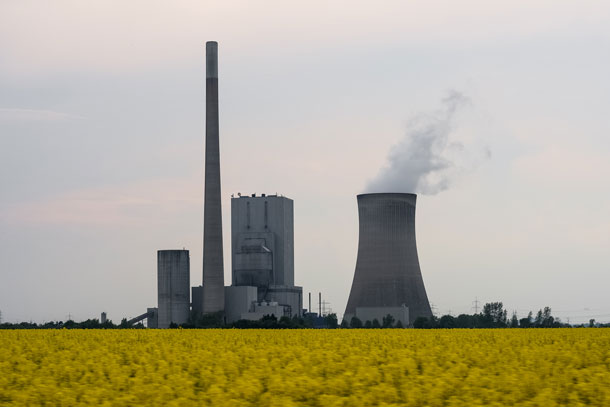
Germany has pledged to end coal-fired power generation in the country by 2038. (Photo: x1klima, Flickr, CC BY-ND 2.0)
CURWOOD: It’s Living on Earth, I’m Steve Curwood.
BASCOMB: And I’m Bobby Bascomb. It’s time for a trip now beyond the headlines with Peter Dykstra. He’s editor of Environmental Health News, that’s EHN dot org and Daily climate dot org. Hey there, Peter! What do you have for us this week?
DYKSTRA: Hi, Bobby, let's start out with an item from Germany. There is a commission there, the government pulled together representatives from the environmental community, the science community, the energy industry, and the business community. And they have set a goal that Germany will be completely out of the coal business for electric generation, within 20 years by the year 2038. Right now, they get one-third of their electricity from coal.
BASCOMB: Wow. So how do they plan to do that, then?
DYKSTRA: As they remove coal, they will substitute it in some cases for natural gas, but also increasingly for renewables. It's worth noting, however, that some environmentalist say that they could do it a lot quicker than that. And in fact, France and the UK have both set goals to be out of coal long before 2038.
BASCOMB: What else do you have for us this week, Peter?
DYKSTRA: There's an item that was published in a peer-reviewed journal in the UK about increasing saltiness in some inland freshwater lakes and streams. They're becoming saltier due to general pollution, agricultural chemicals, fertilizers, and of course, road salts that are widely used in cold weather places in the wintertime.
BASCOMB: So how is that saltiness affecting the ecosystems?
DYKSTRA: Well, it's obviously bad for drinking water, salt, and water can also cause hypertension, and other human maladies. And one other thing that hasn't really been fully explored. But it's a concern raised in this paper is that the increased saltiness and water can liberate other toxic chemicals in waterways and create new problems that we can only imagine.
BASCOMB: Wow. So, it's hard to say at this point, how the salt might affect things long term.
DYKSTRA: No, but it's one more little thing to worry about. A little footnote on the study. One of the scientists signed on to the paper is a legendary guy named Gene Likens, and half a century ago, he was a pioneer in the study of acid rain in New England and throughout North America.
BASCOMB: And what do you have for us this week from the history books?
DYKSTRA: Let's go back to February 8, 1965, Lyndon Baines Johnson in a written message to Congress. It was kind of an addition to the State of the Union address, wrote to Congress and said that there would be problems in the future from both radiation and increased co2. That was from some reporting done for him from Roger Revelle, another legendary scientist, and here's what Johnson said specifically, quote, this generation has altered the composition of the atmosphere on a global scale through radioactive materials and a steady increase in carbon dioxide from burning fossil fuels. Thus, becoming in 1965, the first president to refer to climate change.
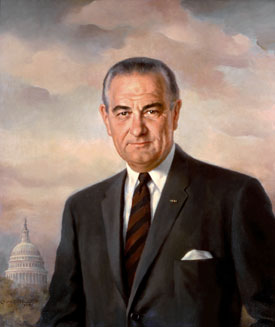
The first American President to discuss the science of climate change was Lyndon B. Johnson in a message to Congress, back in 1965. (Photo: Official White House Portrait, Wikimedia Commons, Public Domain)
BASCOMB: And correct me if I'm wrong, but Roger Revelle, he was a mentor of Al Gore's that, right?
DYKSTRA: He was the guy who taught Al Gore about climate change. And so, we have two legendary environmental scientists. In the segment this week, Gene Likens one of the fathers of acid rain research, and Roger Revelle, one of the pioneers in climate change research.
BASCOMB: Great. Well, thanks, Peter for bringing us that news, Peter Dykstra is an editor with environmental health news. That's ehn.org and daily climate.org. Peter will talk to you again soon.
DYKSTRA: All right, Bobby, thanks a lot. We'll talk to you soon.
BASCOMB: For more of these stories, visit our website loe.org.
Related links:
- The Independent | “Germany Sets ‘Historic’ Deadline to End Coal Use by 2038 in Bid to Curb Climate Change”
- The Revelator | “More Salt in Our Water Is Creating Scary New ‘Chemical Cocktails’”
- Tuluwat Examiner | “LBJ Called It 50 Years Ago, and Some Still Don’t Want to Hear It”
[MUSIC: Eric Clapton, “Driftin'” on From The Cradle, Reprise]
Eminent Domain and the Landowners Who Wouldn’t Back Down
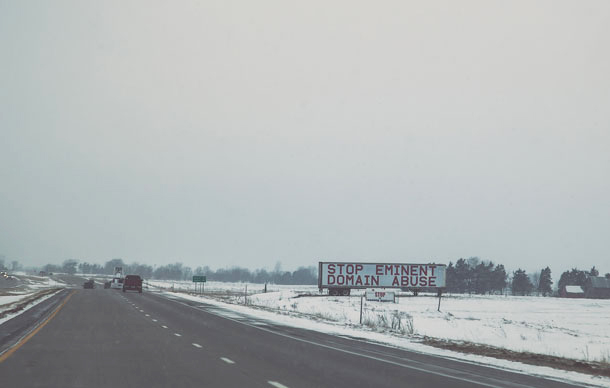
A sign along a highway in Ames, Iowa proclaims “Stop Eminent Domain Abuse – Stop the Bakken Pipeline”. Pipelines, highways, high-voltage transmission lines, and other large infrastructure projects often involve the government invoking its eminent domain power. (Photo: Tony Webster, Flickr CC BY-SA 2.0)
CURWOOD: In Western society, a deed is a binding legal document that grants you ownership over a house or piece of land, until you sell or pass that property on to your heirs. But at any time, the government can take it through eminent domain for a project that it considers to be for the greater public good. But not everyone agrees what is the public good when taking away private property. The project could be an unpopular oil pipeline, highway, or border wall. And even when the project offers a substantial payout, some folks just don't want to leave their homes, and a fierce legal battle follows.
In his new book called The Habit of Turning the World Upside Down, Howard Mansfield looks at American ideas of property. He joins me now in our studio. Howard, thanks for coming in.
MANSFIELD: Thank you. Happy to be here.
CURWOOD: So, you have a number of fascinating stories in your book, Howard. Not all of them are happy stories, and--
MANSFIELD: No.
CURWOOD: --you write about the story of Romaine Tenney, Vermont dairy farmer who in the 60s became -- well, he was known nationally as a symbol of a quickly disappearing America. Tell us the story of what happened to Mr. Tenney when a major highway project was slated to go right through his farm.
MANSFIELD: In 1964, Romaine Tenney was a bachelor farmer. He had no running machinery on his farm. He used workhorses, he milked his 50 or 60 cows by hand. He cut hay with his horses. Everyone in town knew him. The major road happened to hug his cow barns, they would see him there working there late at night. He loved his animals, his animals loved him. And then, Interstate 90, the interstate's coming right up the Connecticut River Valley. And they're laying it out and they take a sight right off his cow barn. And in the end, he refused to move, and they were bulldozing and dynamiting right around his house. And he had to be out, there was a court order. And then one night he set everything on fire, shot himself. He committed suicide. Shook everybody really up. It had to be another way, that this shouldn't have happened. It's a grim story. But at the time progress was the religion of America; progress you could say was the gravity of America. Everyone believed in it, people at the time were happy to settle with the state of Vermont to make way for the interstate. You know, so when hills were leveled, when swamps with filled, people were happy to settle because everyone believed in this new thing coming along. And that has changed.
CURWOOD: So of course, the state was able to put the highway through his land, right, the edge of his barn, because of what we call eminent domain.
MANSFIELD: Yeah, and that's -- so, eminent domain, it's in the Constitution, you have to receive just compensation. And that has been interpreted forever as market value. So, here's the essential problem: to Romaine, the land was far more than its market value. He loved the land. So, you're trying to pit a quality, a feeling, a way of life against something that's quantified. And that's always the problem. And the other problem with eminent domain is that the party taking the property ends up setting the price, even if you appeal and that's basically a broken market.
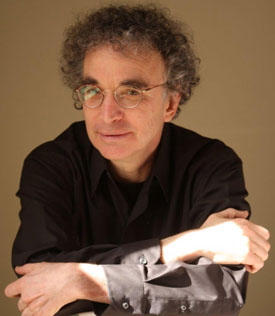
Howard Mansfield writes about history, architecture, and preservation. He lives in New Hampshire with his wife, the writer Sy Montgomery. (Photo: courtesy of Howard Mansfield)
CURWOOD: Well, it's interesting that word -- "just" compensation.
MANSFIELD: Yeah, that's the exact phrase.
CURWOOD: So, "just," of course, is associated with justice.
MANSFIELD: Yes.
CURWOOD: And to what extent does the American system of using eminent domain -- to build highways or put up major shopping centers or schools -- to what extent is that just, Howard?
MANSFIELD: You know, if you look historically, and particularly if you look in the 19th century, you'll see individuals all over the place, bearing the burden of whatever economic improvement is made. There's a legal textbook from 1895, which I read part of and it said, "the quiet citizen must keep out of the way of the exuberantly active one." So, in other words, the burden of proof is on you, the quiet citizen, why your pursuit of happiness should stop property in motion.
CURWOOD: So, talk to me more about America and this ability to use eminent domain; where did it come from? And of course, the way you write, sounds like you feel that we don't have this right at all.
MANSFIELD: Um, well, I think the best answer for where it comes from, is a definite belief in economic progress that everybody shared. Here's a good sample case, just to cut right to the chase. A big railroad's coming through a town in the 1890s or something. They put it through, totally destroy this man's farm, his land, you know -- big sooty mess. Goes to court, the judge says, well, too bad, but you're going to benefit from the overall economic well-being as it improves in town. Well, essentially, that man is now stuck subsidizing this project, he's been assigned risk and expense that he didn't choose. So, there's a great injustice there. I think what you see in a lot of the protests is people are saying, No, no, wait a minute, wait a minute, I have a deed to this land, I've been paying on this land, and you tell me that you have the right of way over my pursuit of happiness? And that seems unfair.
CURWOOD: You write about a rather strange bit of railroad property maneuvering, in something called the Gadsden Purchase
MANSFIELD: Oh, the Gadsden Purchase. Yeah.
CURWOOD: Tell us that story.
MANSFIELD: Okay. Um, when I was in school, they would roll down these maps in front of the classroom. You know, a big map of the West, and you'd see the Louisiana Purchase, which is shaped like a big lamb chop, almost. And then you've got, you know, Texas -- and then there's this little flap of land or the end of the liver, as it was called it in its time. That's the bottom of Arizona and New Mexico. That's the Gadsden Purchase. It happened during the Franklin Pierce presidency, 1850s. It was bought after the war against Mexico, and it was bought so there would be a southern route for the Southern Pacific Railroad. It was completely a railroad deal. But here's the thing about it. I went out to walk on the reservation of the Tohono O'odham. They're beset with a lot of problems, high diabetes rate, high poverty rate, and the desert museum, the Arizona Sonoran Desert Museum out there was having a walk to reestablish traditional diets. So, I walked with them a few days. And I'm as I'm walking along, I realize, Oh, my God, I'm walking in the Gadsden Purchase! And I thought, well, that's really foolish. But on those old maps, there were no people, it was a blank space! But to Tohono O'odham, it's holy space, it's holy land, their sacred peak is there. But to us, it's a blank space on a map, a way through to go someplace else. So, you have two different views of land: somebody's land deal, and it's somebody holy land. And there's that clash.
CURWOOD: So, what does the Gadsden Purchase tell us about the downside of the way we deal with property in the United States?
MANSFIELD: Well, if you look at the, to go back to those maps, they're all about the boundaries and not about what's inside them. So actually, we have it all completely backwards. And if you look at those old schoolhouse maps, that we grew up with, the names of the tribes -- the Pueblos, the Papago, which were the names we had at the time for the Tohono O'odham -- they're just kind of floating across the landscape like clouds, so, therefore, they have no fixed boundaries. So, therefore, in the view of those maps, and in the view of white people and in the view, how the law developed, they have no property rights. And that's another characteristic mark of property in America.
CURWOOD: Now, writing this book, Howard, you follow the stories of some various New England residents fighting the Kinder Morgan gas pipeline called Northeast Energy Direct. So how did they take on North America's largest energy infrastructure company?
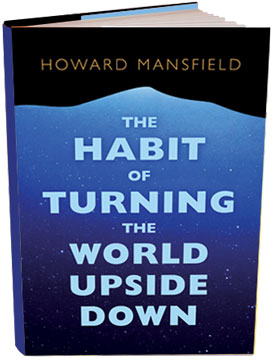
“The Habit of Turning the World Upside Down” explores Americans’ belief in property, and the cost of that belief. (Photo: Bauhan Publishing, LLC)
MANSFIELD: They were dogged. They learned immediately the process, they learned what rights they had, and what rights were lacking. They contacted every possible representative in sight, they learned the energy issues way deep, they sat up late at night, learning all about the needs for natural gas, and were they being met. And what was really in the pipeline. And what's this shortage that happened during one winter -- was that really so? So, they were actually model citizens when you look at it, and they just fought tooth and nail. They showed up, they testified. And then they showed up and they testified again, they met with anybody who would listen to them, they spoke truth to power. And they won.
CURWOOD: What do you think was the critical difference for them? How was it that they stopped this gas pipeline project? Was it that the project was in no small part designed to export natural gas, as opposed to serving the region? Was it because it was going through really loved pieces of land and areas? Was it that the gas people pick the wrong community to go through? What was the key for their success?
MANSFIELD: You know, that's a good question. Partially, I think Kinder Morgan had a failed business model. To start with that, I would just say that. They would never say that. They never said they were going export it, but then they never denied that they were going to export it either. But they were, you know, in a darn hurry to get over to the seacoast there, weren't they?
CURWOOD: At twice the capacity that New England needed.
MANSFIELD: Yeah, yeah. There was all sorts of squirrely things about it. They were sort of masters of giving out incomplete information. There was a number of distinctive things in Massachusetts. And one -- I can't recall the exact name of this law, but you couldn't give up conservation land without like a two-thirds vote of the state legislature. Also, I would say there's a lot of knowledge, a lot of sort of citizen scientist knowledge out there now that so many people have advanced degrees and can connect with the internet. I think those two things make a big difference. I really do.
CURWOOD: Howard Mansfield is the author of The Habit of Turning the World Upside Down, and nine other books. Thanks, Howard for taking the time to stop by.
MANSFIELD: Thank you very much, Steve. I enjoyed it.
Related links:
- “The Habit of Turning the World Upside Down”
- About Howard Mansfield
- Boston Globe | “Kinder Morgan Shelves $3 Billion Pipeline Project”
[MUSIC: Ruben Gonzales, “Tres Lindas Cubanas” on introducing…Ruben Gonzales, by Guillermo Castillo, Nonesuch Records]
CURWOOD: Living on Earth is available to you as a resource any time you need it on the internet at loe.org. There you can hear and read our stories going back nearly three decades, as well as listen to the current show. And you can also find links to our sources and references. But it’s now time to update our website and we’d like to find out what changes you think we should make to our online presence. So please volunteer your advice, comments and suggestions about our web site to comments@loe.org. That’s comments@loe.org, Or call 617-287-4121, 617-287-4121
CURWOOD: Living on Earth is produced by the World Media Foundation.
Our crew includes Naomi Arenberg, Delilah Bethel, Thurston Briscoe, Jenni Doering, Don Lyman, Lizz Malloy, Aynsley O’Neill, Jake Rego, Adelaide Chen, and Jolanda Omari.
BASCOMB: Tom Tiger engineered our show. Alison Lirish Dean composed our themes. You can hear us anytime at L-O-E dot org, iTunes and Google play- and like us, please, on our Facebook page - PRI’s Living on Earth. We tweet from @livingonearth. And find us on Instagram at livingonearthradio. I’m Bobby Bascomb.
CURWOOD: And I’m Steve Curwood, Thanks for listening!
ANNOUNCER: Funding for Living on Earth comes from you, our listeners, and from the University of Massachusetts, Boston, in association with its School for the Environment, developing the next generation of environmental leaders. And from the Grantham Foundation for the protection of the environment, supporting strategic communications and collaboration in solving the world’s most pressing environmental problems. Support also comes from the Energy Foundation, serving the public interest by helping to build a strong, clean, energy economy and from Carl and Judy Ferenbach of Boston, Massachusetts.
ANNOUNCER 2: PRI, Public Radio International.
Living on Earth wants to hear from you!
Living on Earth
62 Calef Highway, Suite 212
Lee, NH 03861
Telephone: 617-287-4121
E-mail: comments@loe.org
Newsletter [Click here]
Donate to Living on Earth!
Living on Earth is an independent media program and relies entirely on contributions from listeners and institutions supporting public service. Please donate now to preserve an independent environmental voice.
NewsletterLiving on Earth offers a weekly delivery of the show's rundown to your mailbox. Sign up for our newsletter today!
 Sailors For The Sea: Be the change you want to sea.
Sailors For The Sea: Be the change you want to sea.
 The Grantham Foundation for the Protection of the Environment: Committed to protecting and improving the health of the global environment.
The Grantham Foundation for the Protection of the Environment: Committed to protecting and improving the health of the global environment.
 Contribute to Living on Earth and receive, as our gift to you, an archival print of one of Mark Seth Lender's extraordinary wildlife photographs. Follow the link to see Mark's current collection of photographs.
Contribute to Living on Earth and receive, as our gift to you, an archival print of one of Mark Seth Lender's extraordinary wildlife photographs. Follow the link to see Mark's current collection of photographs.
 Buy a signed copy of Mark Seth Lender's book Smeagull the Seagull & support Living on Earth
Buy a signed copy of Mark Seth Lender's book Smeagull the Seagull & support Living on Earth

